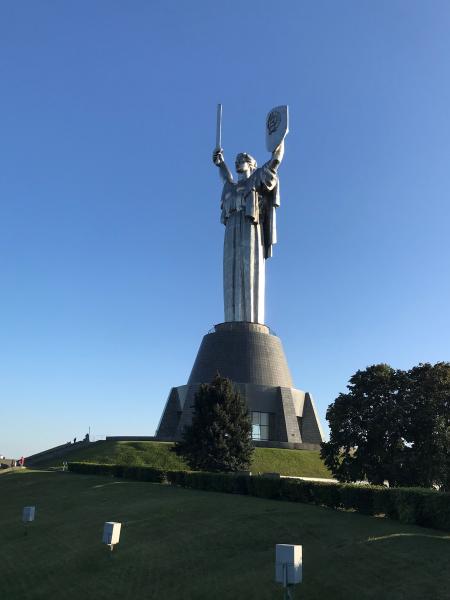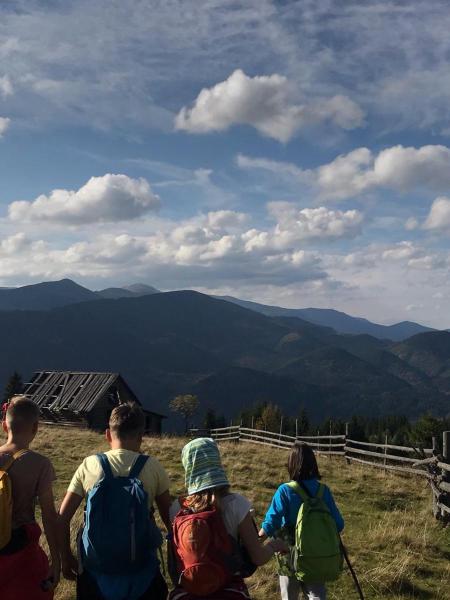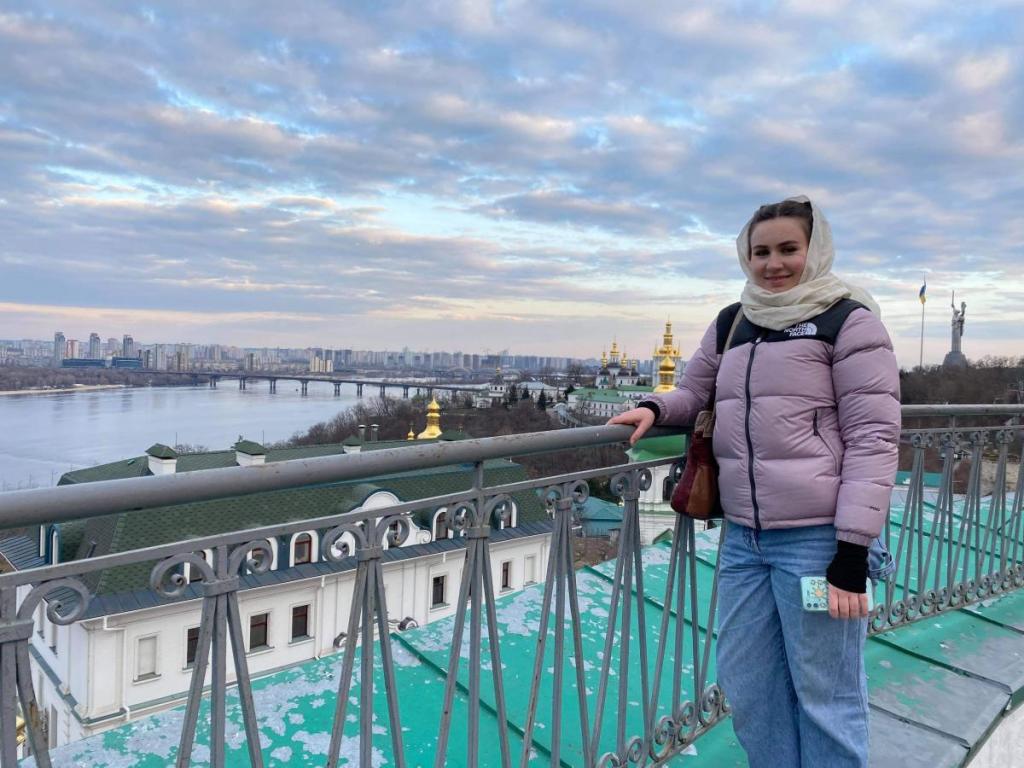
It is a particularly strange time to be a student of Russian language and literature. It is even stranger to be a Russian-speaking student who spent six months of last year in Kyiv, the Ukrainian capital. As a group of Oxford students who ended up in Kyiv instead of Russia rather by chance, it is safe to say we found ourselves in a place that was easy to fall in love with, with people who embraced us wholeheartedly. A lot of those experiences seem dream-like now since the Russian invasion, as we watch the apartment blocks that carved out our skyline and the cafes we floated between on rainy days deserted and destroyed indiscriminately. We watched this destruction both on news channels and on the Instagram stories of our friends, who witnessed their homes evacuated and bombed in the weeks since the 24th of February. It is likely that the Kyiv we shared with them will never quite be the same again. I find myself wondering whether that seedy underground banya near the Golden Gates still exists, whether you can still buy vegetables outside the metro stations, and whether people still gather around café tables on the cobbled streets, smoking and wearing trench coats.
These musings have somewhat replaced the sharp despair and anxiety of the first two weeks after the invasion; a fact that I am resigned to, though not comfortable with. It is easy for us in the UK to turn off the news and put Ukraine to the back of our minds, when the protests have dissipated and the war has become an ugly familiarity in the landscape of our lives. I was speaking to a Ukrainian friend recently, who said that he had become used to the fact that he hears air-raid sirens every day and that there is a curfew at night. He said: “If I’m honest, it isn’t even scary anymore.” It seems that, for the Ukrainians too, a kind of normality reigns. And yet this sense of normality feels undeniably unsettling. Sitting in an Oxford library whilst watching a war on social media creates a kind of cognitive dissonance that makes it hard to sink into my studies of Russian literature as I did before. In February and early March I was glued to my phone for hours each day, sharing and consuming as much information as I could. I compulsively scanned Russian-language news outlets and tried to recognise bombed buildings in shaky videos to work out whether the family I lived with in Kyiv were safe. I ran frantically around Boots collecting supplies for a donation drive for refugees. I passed on information about border crossings and train departures to people trying to leave Ukraine, in the hope that I could help them decipher the torrent of information coursing through social media. In a particularly horrible moment, I thought I recognised a child I taught and lived with in a video that was circulating online, which showed a little boy walking alone and crying on the road to the Polish border. Knowing that he wasn’t the boy in the video didn’t lessen the horrible realisation that he, or any of the other children I taught in Kyiv, could have been.

I have many more impressions of this period of my life which will stay with me alongside the memories of Ukraine as it was when I was there. I know the Carpathian mountains will still be standing at the end of the war, and I know the Ukrainian people will too. Many of those that I know from Ukraine are in their early twenties and are facing the decimation of the life they had just started to build. I want to write about them because their experience of the war is far more relevant and important than my own. I asked several people if they could tell me what their experience has been since the outbreak of war, and how the situation stands for them today. We generally speak in Russian, even though many Russian-speaking Ukrainians have made the decision to change over to Ukrainian in the weeks since the invasion. Though we didn’t quite know it at the time, I think we British Russian-speakers in Ukraine captured a particular moment in the usage of the Russian language in Ukraine before the linguistic landscape of the country altered once again, and perhaps more drastically. As such, the Kyiv we knew before the war may now be less accessible to us in more ways than one.
I met Lyova in my first days in Kyiv in September 2020 when I was invited to a launch party for a single released by another friend. The party was held in the design studio of a fashion designer for whom Lyova was a photographer. Many of the people we met in Ukraine were creative types: photographers, models, and designers, as well as an aspiring poet and an emerging singer. Many of these people have now become scattered across Ukraine and across Europe as a result of the war. Lyova left Kyiv with several friends on the day the war broke out and went to a dacha (summer house) in a nearby village, intending to go on to Lviv. On the 25th of February, it became apparent that it was already too late to make this journey due to Russian occupation of the area, which is right next to the now infamous Bucha. He and his companions spent twelve days in a basement in a house in the village. After two days they were without light, then heating, and then water. They slept in six pairs of socks and three pairs of trousers. Friends were frantically posting on social media trying to find a way to get them out, but a green corridor never materialised. They heard of an escape attempt that consisted of a column of thirty cars, out of which only five were successful. The rest of the civilians trying to escape were shot or taken into captivity by the Russian army. Lyova does not quite recall whether it was March 7th or 8th that he himself made his attempt, but he does know that five cars at the back of his convoy did not make it to safety, and that among those killed were his neighbours in the village. Their drive to the city of Vinnytsia was accompanied by the sound of explosions, and he remembers seeing two Russian planes shot down by the Ukrainian army. He is now working with a psychotherapist, as are many Ukrainians, a service which the government is offering free of charge. A few weeks before the war broke out, Lyova had an accident on a motorised scooter and sustained a serious head injury. He is currently waiting for a ‘white ticket’ which will exempt him from the army, so that he can travel to the UK to complete his interrupted treatment. The experience has completely changed his hierarchy of values: life comes first, then health, and then peace. Above all, he is grateful that he was able to get out.
Inna was my colleague when I worked at an elementary school in Kyiv, and together we taught English to many classes of excitable, primary-age children. We have stayed in regular contact since the outbreak of the war and I have taught several children from the school on Zoom whilst they stay in Poland, Hungary and rural Ukraine. She told me that on the 24th she, like many other Ukrainians, woke up to strange noises at five in the morning. She had been dreaming about the war all night, and when she eventually got up and looked at her phone, there was a message on her work group chat: “It has begun. They are already by Boryspol [one of Kyiv’s airports], gather water”. She remembered that during the Second World War the most fierce battles were for control of the Dnipro river, which cuts Kyiv in half, the two sides connected by several bridges. She realised that if they destroyed the bridges she would be cut off from her family, who lived on the other side. Inna walked to the metro station and managed to get on a free train to the other side of the city, but the only way out of Kyiv was by car, and there was a column of cars six rows wide trying to leave the capital, driving up the incoming lanes as well as the outgoing. When she eventually made it to her family home they heard explosions in the distance as the Russian army bombed the airports, and then another explosion much closer, aimed at the power plant just a kilometre from their house. The Ukrainian air defence managed to shoot down this rocket, but a fragment of it landed 300 metres from her home. They grabbed a handful of essential items and drove to their dacha, where they have remained ever since. On the way they passed a plane which had been shot down into a field. She says there is still no sense of what tomorrow may hold, although she can now make tentative plans for a week ahead, rather than the next two or three hours, as she had been previously. All of her friends and colleagues have scattered and she is working online for half of her usual salary. In some ways, life has returned somewhat to normal – the cafes and shops are working again, and some people are returning to the cities. But she is tormented by the anxiety that a 500 kilogramme rocket could drop on her house at any minute, by the noise of the air raid sirens, and by harrowing stories from the occupied territories and Mariupol. She told me: “It is hell on earth, which our neighbour has built for us, and it is simply impossible to accept or forgive…”
Alyona is a third-year Durham student who travelled to Ukraine to get a visa for a foreign year abroad placement and to visit her grandparents. She arrived at Boryspil airport on the 23rd of February and took a taxi to her aunt’s house near Kyiv as it was too late to drive home to Baturyn. She was woken up by the sounds of explosions and her aunt rushing into her room to tell her that Russian troops had invaded Ukraine and that Kyiv was under missile and artillery attack. They went to the supermarket to try and get some supplies, with no idea where they would be going. They decided not to travel straight away because of news of huge queues of traffic leaving Kyiv and instances of debris from missiles falling on stationary cars. She spent that night with her family in a local school’s underground gym, which was being used as a bomb shelter, and heard the fighting intensify outside. They left Kyiv the next day and went to stay in the home of a family friend just outside the city, hoping it was safe there. The next morning it became clear this was not the case, as troops were pushed out of the capital and began launching missile and artillery attacks on the nearby villages. As they drove away from the village they had been staying in they saw successions of military vehicles beginning to surround it. It was at this point that I became aware of Alyona’s situation through our mutual friends in the UK, who were desperately trying to help her find a safe route to travel out of Ukraine by car. She was travelling with her aunt, two young cousins, her cat and six ginger kittens. They drove through forests and villages to avoid highways, being told by friends which areas had already been encircled by Russian troops. They also avoided bridges, which were being bombed to disconnect cities. Their fuel began to run out, and they were forced to make detours in search of any places that still had sufficient fuel to complete their journey, which would normally take seven hours, but stretched out to two days. Eventually, after stopping in Vinnytsia and Smila and passing through several military checkpoints, they made it to the Moldovan border, managing to get themselves and all the kittens to safety. Alyona has since returned to Durham where she studies Arabic and French, whilst most of her family remain in Ukraine.

I asked Masha to describe her experience to me partly because she was abroad when the war broke out, on holiday in Berlin. She told me it is very difficult to explain what she felt and feels – the emotions are still very fresh and she had never experienced them before the outbreak of war. She had already extended her trip to Berlin for a few days at the request of her father, who was very worried by what he saw on the news. She was expected home on the 28th of February, but woke up on the 24th to countless messages from her friends and family, mainly assuring her that they were safe. She says the first few days after this were like the worst nightmare she has ever experienced, finding herself alone in an unknown country away from her loved ones. She also felt great guilt at not being able to help them evacuate out of danger and into safety. On the first day of the war her brother joined the Ukrainian army and her mother and grandmother managed to get to Western Ukraine, which at that time was less dangerous. Feeling helpless in Berlin, Masha went to volunteer with refugees in Warsaw and spent a month there doing what she could. But she says she ‘woke up every day with thoughts of home and tears in her eyes’. She couldn’t work out where she ought to stay whilst she waited out the end of the war, and her family would not allow her to return home. She spent two months travelling through five different countries in the hope of finding one where things would become easier for her, and where she might be able to find some kind of living arrangement and employment to help her family from abroad. But she recalls that at the start of April it became unbearable to be surrounded by people who wanted to help but did not understand what you were going through, and so she decided to return to Kyiv. The majority of her family is still abroad, and her brother remains in the army in Ukraine. You can still hear sirens every day and night in Kyiv and the city is very different from how it was in peaceful times. There are lots of blockades, a curfew and constant trips to the bomb shelter, and yet she feels an internal peace from knowing that she is at home, in her home country. She is volunteering and trying to complete university remotely, but her heart is with the parts of Ukraine which are occupied and being shelled continually, and reading the news about violence towards children is extremely painful. The Russian language, which she used to use every day, now disgusts her, and so she tries to only use Ukrainian when talking to anyone who understands it. She says that whilst she has always been interested in Ukrainian history and culture, now she surrounds herself exclusively with content related to the war and her homeland, which she adores; it makes her extremely proud to be Ukrainian. She is convinced that Ukraine will win, and soon[1].
[1] All names and identifying features have been changed for the purpose of anonymity, apart from in Alyona’s story, as she has already gone public with her testimony. See: https://www.thenorthernecho.co.uk/news/19967844.durham-uni-student-rescued-kittens-fleeing-kyiv-ukraine/